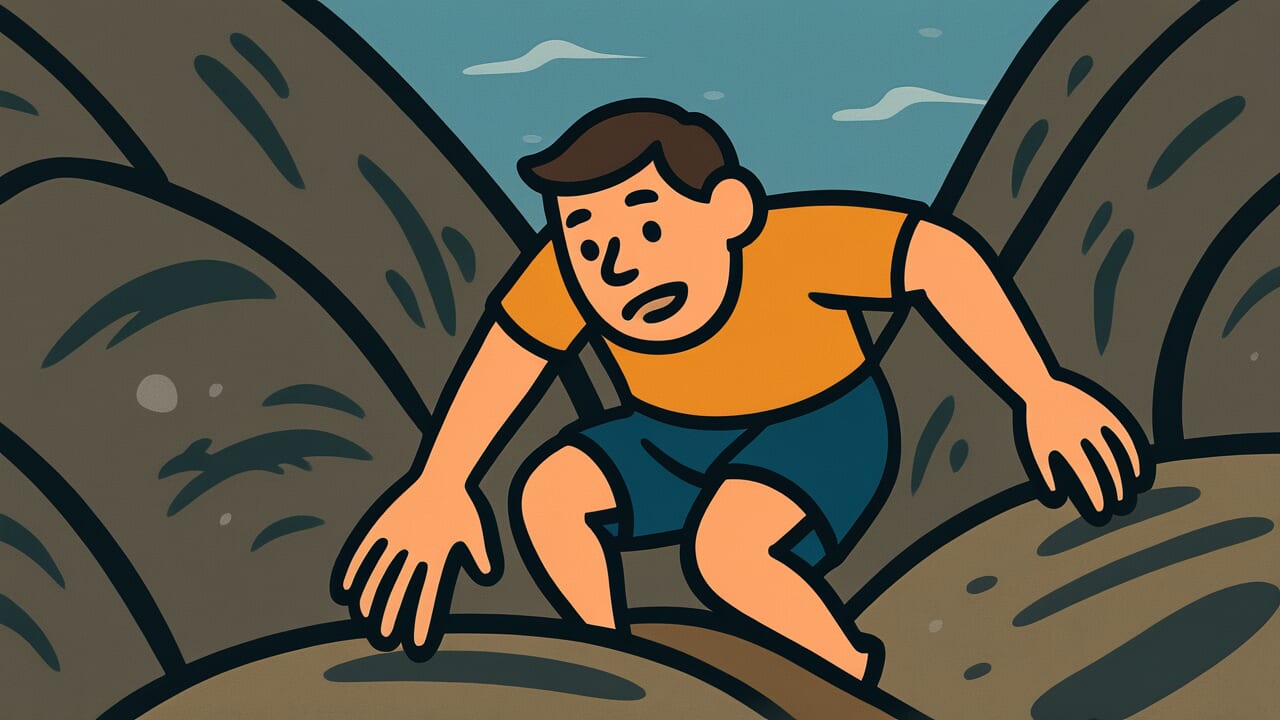How to Read “Climbing is slippery”
Climbing is slippery
[KLAHYM-ing iz SLIP-er-ee]
All words use standard pronunciation.
Meaning of “Climbing is slippery”
Simply put, this proverb means that moving up in life often involves unexpected dangers and setbacks.
The literal words paint a clear picture. When you climb something slippery, each step becomes risky. You might lose your grip or slide backward. The proverb uses this image to describe any kind of upward progress in life.
This saying applies to many situations today. Getting promoted at work can create new enemies or responsibilities. Making more money might bring tax problems or jealous friends. Even good students sometimes struggle when they reach harder classes. Success often creates problems we didn’t expect.
What makes this wisdom interesting is how it warns us gently. It doesn’t say climbing is impossible or wrong. Instead, it reminds us to be careful and prepared. The proverb suggests that smart people expect difficulties even when things are going well.
Origin and Etymology
The exact origin of this specific proverb is unknown. However, climbing metaphors have appeared in various forms throughout history. Many cultures developed similar sayings about the dangers of advancement.
During medieval times, social mobility was extremely limited. Most people stayed in the same social class their entire lives. When someone did manage to rise in status, they often faced serious risks. Other nobles might see them as threats or upstarts.
The concept spread through oral tradition and written works over centuries. Different versions emerged in various languages and regions. The basic idea remained consistent across cultures. People observed that success often brings unexpected challenges and used climbing imagery to express this truth.
Interesting Facts
The word “slippery” comes from Middle English and originally meant “causing things to slip.” It combines the verb “slip” with the suffix “-ery” meaning “having the quality of.”
Climbing metaphors appear frequently in proverbs because they create vivid mental images. The physical act of climbing requires balance, strength, and careful planning. These same qualities apply to social or professional advancement.
Many languages use similar metaphors linking upward movement with danger. This suggests that humans naturally connect physical climbing challenges with life’s advancement difficulties.
Usage Examples
- Mentor to apprentice: “Don’t get overconfident after that promotion – climbing is slippery.”
- Friend to friend: “He’s making enemies on his way to the top – climbing is slippery.”
Universal Wisdom
This proverb reveals a fundamental tension in human nature between ambition and security. Throughout history, people have observed that progress rarely follows a straight, safe path. The desire to improve our situation conflicts with our need for stability and predictability.
The wisdom emerges from countless generations watching ambitious individuals face unexpected consequences. Success changes the rules of the game. New heights bring new winds, new pressures, and new ways to fall. What worked at lower levels often fails at higher ones. The skills that got someone promoted might not help them succeed in their new position.
This pattern exists because advancement disrupts existing relationships and systems. When someone rises, they leave familiar territory behind. Old friends might feel abandoned or jealous. New peers might view them as outsiders. The person climbing must navigate these shifting social dynamics while learning new skills and responsibilities. The “slipperiness” comes from this constant need to adapt and balance competing demands.
When AI Hears This
People plan their climb assuming they’ll keep the same careful control they had before. But advancement itself changes how decisions work. The faster someone moves up, the less time they have for detailed choices. Success creates its own momentum that pushes people forward faster than they expected.
This happens because humans mistake climbing for a bigger version of walking. Walking lets you stop and think at each step. Climbing forces you to commit to movements before you fully understand what comes next. The brain keeps using ground-level planning for situations that need flow-based thinking instead.
What’s remarkable is how this “flaw” actually helps humans achieve impossible things. If people truly understood how little control they’d have while climbing, most would never start. The illusion of control gets them moving. Then momentum carries them to heights that careful planning never could reach.
Lessons for Today
Living with this wisdom means preparing for success as carefully as working toward it. Smart climbers don’t just focus on reaching the next level. They also develop the skills needed to stay there safely. This includes building genuine relationships, maintaining humility, and continuing to learn.
The insight helps in relationships too. When friends or family members experience success, we can support them through the difficult adjustments. We can also avoid the trap of assuming that people who achieve something had an easy path. Understanding that climbing is slippery makes us more compassionate toward both success and failure.
For groups and organizations, this wisdom suggests the importance of supporting people through transitions. Companies that promote employees without proper training often see those people struggle or fail. Communities that celebrate achievements while providing ongoing support create more sustainable success. The goal isn’t to avoid climbing but to make the journey as stable as possible while accepting that some slipperiness is inevitable.



Comments